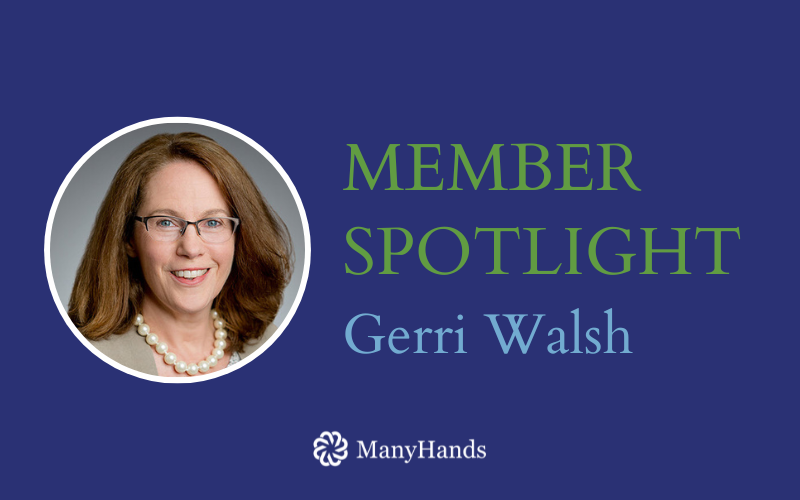Gerri Walsh has been a Many Hands member since 2019. After beginning her legal career in private practice, she spent more than a decade at the US Securities and Exchange Commission before moving to FINRA—the Financial Industry Regulatory Authority—a government-authorized not-for-profit organization that oversees US broker-dealers. She currently serves as senior vice president for investor education at FINRA and as president of the FINRA Investor Education Foundation.
What launched you on the road that brought you to FINRA?
I am a lawyer who took herself off the beaten path 25 years ago to focus on investor education because I felt it was a better way for me to give back and to really help people. That’s always been a defining goal in my life—to figure out how to use my time, my talent, and my treasure to better the lives of other people.
Why investor education?
I made some pretty uninformed decisions as a law student when it came to managing money; that’s how I became interested in personal finance. My family also has an immigrant story that’s an important part of how I show up. I’m the daughter of Irish immigrants who were blue-collar workers. My sisters and I were among the first in my family to go to college, and I’m the first to get a graduate degree. I have always believed that the US holds so many possibilities for newcomers and people who have been outside the mainstream of the financial services industry because that’s who I was growing up. My parents didn’t have investments, but they were fortunate to be able to rely on pensions. My dad was a union carpenter; my mom was a secretary at a hospital system. Without that financial stability, my siblings and I would have been lost. So I feel that it’s really important to help other people navigate that path toward economic well-being.
One of the areas where FINRA does a lot of work is financial inclusion. What does that mean?
When it comes to investor education and the FINRA Foundation, we pay particular attention to the importance of focusing on racial, social, and economic justice. We realize that systemic barriers to participation in our capital markets, specifically, and in financial markets, more broadly, have prevented many people in the US from achieving that mythical American dream.
As we address these issues, it’s really important to reach out to the communities we want to support and, particularly, to the intermediary organizations working in those communities to promote financial stability. We have funding, and we have ideas about solutions that can help move the ball forward and create meaningful impact, but we don’t have all the answers.
At FINRA, inclusivity is very much about bringing together people with diverse views and backgrounds to move forward our goals and our work. We always try to listen and engage after taking in a variety of inputs, even when we think we already know the answer.
As an experienced grantmaker, how do you view the work of Many Hands?
One reason I find Many Hands and its mission so appealing is the philanthropic approach that’s built into its values. It’s unfortunate when organizations are certain they have a solution for a community that’s struggling, when in fact the community itself knows what it needs. So I really love the idea of trust-based philanthropy. At Many Hands, we trust the organizations to whom we give our funds to do the right things and to have impact in a way that truly meets the needs of the organization, the community, and the individuals in the community that the organization serves.
You really need to have a partnership model where the funder and the organization are in alignment. When someone seeks funding for a project and the grantmaker wants to tinker with the project, to force it in a particular direction, or to use it to tick a box, that’s a mismatch—and potentially a formula for disaster.
One of the core practices of trust-based philanthropy is offering support beyond the check. What could that mean for a funder like Many Hands?
Support beyond the check has to happen organically. At Many Hands we bring people together to create a larger impact by pooling our gifts. But if the help we offer beyond that requires an organization to engage in additional work that isn’t funded, that could be a strain. There’s always that balance to find: you can provide more, but is it what they need?
Many people come to Many Hands to learn more about grantmaking, but this is an area where you already have deep expertise. What do you gain from being a Many Hands member?
I believe wholeheartedly in Many Hands’ mission and hope to be involved even more in the coming years. Many Hands already makes me feel like I’m giving more than I ever thought I could, and I look forward to being able to network with like-minded people, share the joy of serving on a committee, and think together about how, particularly in the economic empowerment realm, we can help expand possibilities for people through a generous grant award.
—Interview by Mary Kwak


